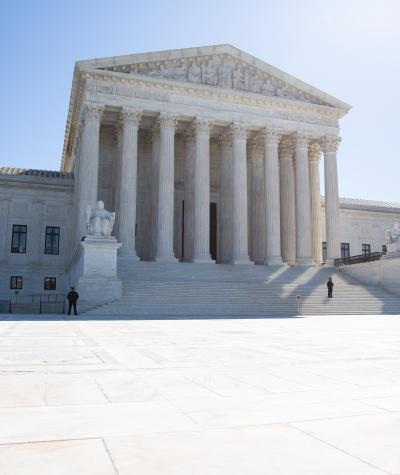When Black and brown voters are forced to vote under discriminatory electoral maps, they have fewer opportunities to make their voices heard on the issues that matter most to them and elect representatives who reflect their values and will fight for their communities.
Thankfully, on June 8, 2023 the Supreme Court issued a landmark decision that is a major victory for fair maps and the freedom to vote, the Supreme Court in Allen v. Milligan (formerly Merrill v. Milligan) affirmed a lower court’s decision to invalidate a congressional map that diluted Black votes in Alabama. The ruling also reaffirmed the validity of Section 2 of the Voting Rights Act (VRA) as a key protection for minority voters’ freedom to vote in fair Congressional districts.
At the core of Allen v. Milligan is a congressional map crafted by Alabama lawmakers that was a textbook example of racial vote dilution. This practice involves packing some Black voters into a single district, while dividing other clusters of Black voters into multiple districts to diminish their overall political influence.
A district court temporarily blocked the map from going into effect, recognizing that a second compact majority-Black district could have been created and the failure to do so was a likely violation of Section 2 of the VRA. The state of Alabama appealed to the Supreme Court, arguing that Section 2 was unconstitutional—an argument the Supreme Court correctly rejected.
Section 2 of the VRA, which prohibits states and localities from creating racially discriminatory voting maps, is one of the most important tools available to ensure that voters of color -- who have historically been denied the freedom to vote—can fully and equally participate in democracy.
Campaign Legal Center (CLC) filed a friend-of-the-court brief, which was referenced during oral arguments, which maintained that Alabama’s attacks on Section 2 of the Voting Rights Act were unfounded. CLC’s brief offered several remedies the state of Alabama could have taken that did not dilute Black voices while still satisfying constitutional requirements and Alabama’s other priorities.
In upholding the validity of Section 2, the Supreme Court preserved a vital tool designed to make democracy more equitable and accessible for voters from historically disenfranchised communities. However, there is still a long way to go to make sure every vote counts equally and every voice is heard in our democracy.
Over the past 15 years the Supreme Court has made a series of anti-democratic decisions, including Shelby County v. Holder, which eviscerated Section 5 of the VRA, gutting the incredibly important “preclearance” process.
Preclearance dramatically transformed the freedom to vote for Black voters in the South by requiring states and localities with a history of racial discrimination to get voting law changes cleared by the Department of Justice or a three-judge federal court panel before going into effect.
The Supreme Court then issued another ruling in Brnovich v. DNC that weakened Section 2 of the VRA by making it harder to use Section 2 to win relief against laws that disparately burden the freedom to vote for Black and brown voters.
While the Court’s ruling in Allen v. Milligan means Section 2 will live on, the VRA is still living on life support due to the Court’s other recent decisions limiting its scope.
Congress has the power to restore the full power of the VRA, and now is the time to act. With another election around the corner, Congress must pass the John Lewis Voting Rights Advancement Act, which would revitalize the VRA by restoring preclearance and strengthening Section 2.
In the meantime, states can act right now to protect the freedom to vote for their citizens by passing State Voting Rights Acts (State VRAs.) These laws, which have already been enacted in five states and has passed the state legislature in Connecticut, make it easier for communities of color to prove that a map or voting system discriminates against them through racial vote dilution and can even go above and beyond the protections afforded by the federal VRA.
Black and brown voters in Alabama and across the country deserve to have a say in the issues that impact their lives. When self-interested politicians draw voting maps that suit their own interests instead of the needs of the communities they represent, we are left with a weaker democracy that is less inclusive and accountable to the people it is meant to serve.
While the Supreme Court’s ruling in Milligan is heartening, the fight doesn’t end here. Voters in other states and counties are still suffering under maps that discriminate against Black and brown voters, and CLC will continue to challenge unfair maps and anti-voter laws that undermine the fundamental freedom to vote, so every voter can make their voice heard.

